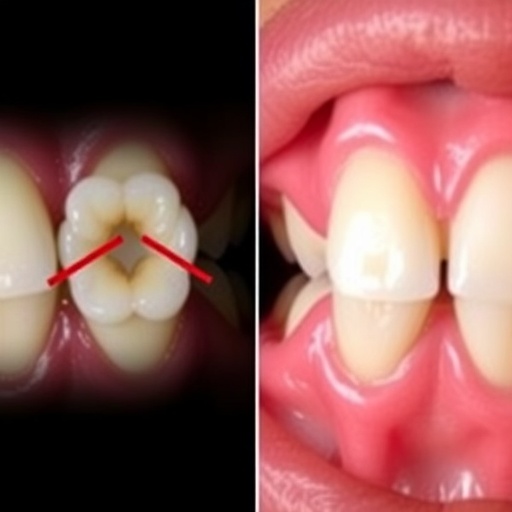In a revealing study captured within the realms of dental education, researchers M.E. Kalender and F. Ucan Yarkac have unveiled a significant gap in knowledge and attitudes regarding peri-implant diseases among final-year dental students in Turkey. This research sheds light on a critical component of oral health that underpins the success of implantology—a field that has gained substantial traction in modern dentistry. Implants have become a preferred choice for replacing missing teeth, emphasizing the need for comprehensive education on the complications that can arise, particularly peri-implant diseases.
Peri-implant diseases, which include peri-implant mucositis and peri-implantitis, are inflammatory conditions affecting tissues around dental implants. Such diseases pose challenges not only to patients but also to dental practitioners who must manage these potential complications. The study conducted by Kalender and Ucan Yarkac aimed to assess whether the dental curricula in Turkey adequately prepare future dentists to recognize, manage, and prevent these ailments. Their findings offer a glimpse into the prevailing educational methodologies and highlight the urgent need for reform in training protocols.
The research involved surveying final-year dental students, granting the authors unique insights into the students’ perceived knowledge and attitudes towards peri-implant diseases. Participants reported varying levels of confidence regarding their understanding of these complications, which often reflect a crucial misunderstanding of their prevalence and impact on dental implant success. By pinpointing these areas of uncertainty, the study aims to pave the way for educational enhancements that could better equip graduating dental students.
Notably, a substantial portion of students expressed a lack of exposure to clinical cases involving peri-implant diseases during their academic tenure. This underscores an alarming trend wherein theoretical knowledge does not sufficiently translate into practical understanding. Given the complexities attached to diagnosing and treating these conditions, it is vital for educational institutions to integrate more hands-on experiences and case discussions into their programs, thereby bridging the gap between theory and practice.
Kalender and Ucan Yarkac also explored how students perceive their current knowledge and training as adequate for real-world clinical scenarios. Their responses highlighted an unsettling reality: Many students feel underprepared to tackle peri-implant diseases effectively upon graduation. This disconnect between self-perceived readiness and actual competency invites a reevaluation of how dental education is structured, particularly concerning peri-implantology.
Furthermore, the researchers noted a notable discrepancy in the attitudes of students towards continuing education and professional development. While a significant number of respondents acknowledged the importance of staying informed about peri-implant diseases, only a fraction actively sought out extra learning opportunities post-graduation. This raises questions about the commitment of emerging dental professionals to ongoing education, which is essential for adapting to the evolving landscape of dental science and practice.
The study’s implications stretch beyond dental education; they resonate deeply within the dental community as a whole. As implant technology evolves and becomes more sophisticated, so too must the training that prepares dental professionals to navigate associated challenges effectively. Educators and policymakers must address these gaps by revising existing curricula to include comprehensive modules on peri-implant diseases, thereby ensuring that graduates are not only equipped with foundational knowledge but also with the practical skills necessary for clinical success.
Moreover, the perspectives of students gathered in this research may serve as a catalyst for broader discussions about how dental institutions can foster a culture of inquiry around peri-implant health. Engaging students in research, peer-led discussions, and practical workshops could enhance their understanding and drive a commitment to lifelong learning. This shift could ultimately lead to improved patient outcomes and reinforce the credibility of the dental profession.
In light of the findings, it becomes evident that both educators and students must take a proactive stance towards enhancing the knowledge base surrounding peri-implant diseases. This can include developing resource materials that provide updated guidelines and best practices for managing such complications, thereby empowering future dental professionals to take ownership of their continual education.
The research carried out by Kalender and Ucan Yarkac is a pivotal step towards addressing educational shortcomings in dental training. By shining a spotlight on the gaps in knowledge and attitudes regarding peri-implant diseases, this study not only serves to inform curriculum redesign but also calls for a collective commitment from educators, students, and the dental community to prioritize effective education in this critical area of dentistry.
In conclusion, as dental implants become a cornerstone of restorative dentistry, understanding and addressing peri-implant diseases is essential. The insights from this research underscore the need for dental schools to invest in comprehensive educational frameworks that extend beyond traditional lectures. Future dentists must emerge from their training not only with theoretical knowledge but also with the practical skills and confidence to ensure the success of their patients’ implants, paving the way for a healthier future in dental care.
The dialogue initiated by this research is poised to influence how dental education evolves in the coming years, potentially leading to more robust training programs and ultimately better patient care in the field of implant dentistry. As the study’s findings resonate throughout the academic community, it remains imperative that we prioritize education that reflects the realities of modern dental practice.
Subject of Research: Knowledge and attitudes of final year dental students in Turkey on peri-implant diseases.
Article Title: Knowledge and attitudes of final year dental students in Turkey on peri-implant diseases.
Article References:
Kalender, M.E., Ucan Yarkac, F. Knowledge and attitudes of final year dental students in Turkey on peri-implant diseases.
BMC Med Educ 25, 1313 (2025). https://doi.org/10.1186/s12909-025-07831-2
Image Credits: AI Generated
DOI:
Keywords: peri-implant diseases, dental education, implantology, dental students, curriculum reform, continuing education.




